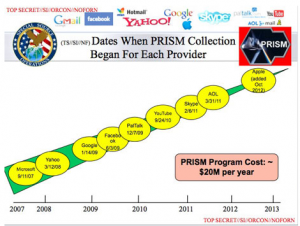Once Upon a Time the PRISM Companies Fought Retroactive Immunity
 Since the disclosure of the PRISM program, I have thought about a letter the industry group for some of the biggest and earliest PRISM participants — Google, Microsoft, and Yahoo — wrote to then House Judiciary Chair John Conyers during the 2008 debate on FISA Amendments Act. (The screen capture reflects a partial list of members from 2009.)
Since the disclosure of the PRISM program, I have thought about a letter the industry group for some of the biggest and earliest PRISM participants — Google, Microsoft, and Yahoo — wrote to then House Judiciary Chair John Conyers during the 2008 debate on FISA Amendments Act. (The screen capture reflects a partial list of members from 2009.)
Remarkably, the letter strongly condemned the effort to grant companies that had broke the law under Bush’s illegal wiretap program immunity.
The Computer & Communications Industry Association (CCIA) strongly opposes S. 2248, the “FISA Amendments Act of 2007,” as passed by the Senate on February 12, 2008. CCIA believes that this bill should not provide retroactive immunity to corporations that may have participated in violations of federal law. CCIA represents an industry that is called upon for cooperation and assistance in law enforcement. To act with speed in times of crisis, our industry needs clear rules, not vague promises that the U.S. Government can be relied upon to paper over Constitutional transgressions after the fact.
CCIA dismisses with contempt the manufactured hysteria that industry will not aid the United States Government when the law is clear. As a representative of industry, I find that suggestion insulting. To imply that our industry would refuse assistance under established law is an affront to the civic integrity of businesses that have consistently cooperated unquestioningly with legal requests for information. This also conflates the separate questions of blanket retroactive immunity for violations of law, and prospective immunity, the latter of which we strongly support.
Therefore, CCIA urges you to reject S. 2248. America will be safer if the lines are bright. The perpetual promise of bestowing amnesty for any and all misdeeds committed in the name of security will condemn us to the uncertainty and dubious legalities of the past. Let that not be our future as well. [my emphasis]
Microsoft, Yahoo, and Google all joined PRISM within a year of the date of the February 29, 2008 letter (Microsoft had joined almost six months before, Google would join in January 2009).
 Clearly, the demand that the companies that broke the law not receive retroactive immunity suggests none of the members had done so. It further suggests that those companies that did break the law — the telecoms, at a minimum — had done something the email providers wanted them held accountable for. This suggests, though doesn’t prove, that before PRISM, the government may have accessed emails from these providers by taking packets from telecom switches, rather than obtaining the data from the providers themselves.
Clearly, the demand that the companies that broke the law not receive retroactive immunity suggests none of the members had done so. It further suggests that those companies that did break the law — the telecoms, at a minimum — had done something the email providers wanted them held accountable for. This suggests, though doesn’t prove, that before PRISM, the government may have accessed emails from these providers by taking packets from telecom switches, rather than obtaining the data from the providers themselves.
Google had also fought a DOJ subpoena in 2006 for a million URLs and search terms, purportedly in the name of hunting child pornographers.
And those of us who follow this subject have always speculated (with some support from sources) that the plaintiff in a 2007 FISA Court challenge to a Protect America Act (the precursor to FISA Amendments Act) was an email provider.
All of those details suggest, at the very least, that email providers (unlike telecoms, which we know were voluntarily giving over data shortly after 9/11) fought government efforts to access their data.
But it also suggests that the email providers may have treated PRISM as a less worse alternative than the government accessing their data via other means (which is a threat the government used to get banks to turn over SWIFT data, too).
It seems likely the way the government “negotiates” getting data companies to willingly turn over their data is to steal it first.

This is a bit of a side issue, but the NSA Prism slides show a classification of TOP SECRET/SI/ORCON/NOFORN. The acronyms in the classification breakdown as Top Secret, Signals Intelligence, Originator Controlled, and No Foreign dissemination (http://www.guardian.co.uk/world/2013/jun/06/us-tech-giants-nsa-data).
Belatedly, it occurred to me that when DNI Clapper issued a statement about Prism (http://www.dni.gov/index.php/newsroom/press-releases/191-press-releases-2013/869-dni-statement-on-activities-authorized-under-section-702-of-fisa), wasn’t he breaking the law?
Isn’t the National Security Agency the originator who controlled the classification of the Prism program? According to news reports, it is the NSA who has made the criminal referral to the Justice Department.
Or has DNI Clapper been gifted with the ultimate in declassification authority for anything and everything just like Bush did for Cheney?
“Clearly, the demand that the companies that broke the law not receive retroactive immunity suggests none of the members had done so. It further suggests that those companies that did break the law — the telecoms, at a minimum — had done something the email providers wanted them held accountable for.
A further point may be that the email providers wanted to be gifted with that very same retroactive immunity that the telecoms got, and perhaps they were.
@Snoopdido: Not really. It says they DIDN’T want that to pass.
Let us all pause, bretheren, and consider the parable of John Wilkes, on the 250th anniversary of George III’s issuance of General Warrants to discover the source of the 45th edition of The North Briton’s scurrilities.
Authority was offended. Wilkes was imprisoned. General warrants were denounced- and nowhere more strongly than in the restless colonies. And, thirty eight years later, they were specifically banned in the Fourth Amendment of the Constitution of the United States whose very existence was not unrelated to the events in that annus mirabilis 1763.
@emptywheel: Well, as their own statements make clear, they were strongly in favor of prospective immunity, so it would seem that they too wanted onboard the immunity train before it left the station.
Keep in mind that for a long time telecoms have not had to list on their books the money they got from various governmental entities for wiretapping services, pen registers and the like. As I recall it, this change to the securities (stocks and bonds securities, that is) laws came about in the 1970s when the telecoms or government (is there a difference?) decided that the Russians or whatever foreign power could figure out how much wiretapping was going on by reading the telecoms’ SEC disclosures.
Not that they could figure out “who” was being tapped, just how much. I never gave the argument much credence, if only b/c it’s far too easy for creative accountants to hide income under irrelevant line items when they need to.
But, the fact remains that the telecoms were not giving away to the government any of the information or access they were giving them since 9/11. They were charging for every last bit of it, the government was paying, and no one outside a few close compartments in the government and the top executives of the telecoms knew how much, when or exactly what for.
Recall also that Joe Nacchio, then head of QWest, said “no” when the NSA came calling post 9/11 “asking” that QWest give the government access like the other telecoms did. Nacchio’s basis was his belief (reasonable) that what the government wanted to do was illegal. So, in a couple months thereafter, QWest lost some government contracts and work, their stock cratered, and Nacchio was prosecuted for stock fraud when the predictions of where the stock would be didn’t come true. FWIW, a lot of people lost their life savings in QWest stock and that was given as a supporting reason for prosecuting Nacchio. At the same time, a lot of people lost their life savings about the same time when Lucent stock cratered similarly and no one was prosecuted over that.
Last I heard, Nacchio’s still in federal prison.
So, after viewing the history it’s fair to say your argument that the government steals it first does not go far enough. The email providers and computer companies were not getting the same kind of money – secret welfare payments – from the government. Moreover, the government held out the welcoming possibility of years in federal prison for anyone who had the temerity to resist and of a free pass for all sorts of arguable crimes for those who cooperated.
@Snoopdido: That authority can be delegated. Also, read the FAQ at dni.gov.
The Spies over heard by Steve Clemons apparently were attending a celebration for Spymaster Michael Hayden.
What sycophants. Of course our tax money paid for this expensive and admirable display of arrogant excess. It is admirable and it is special that spies can publicly threaten citizens with assassinations. There may be other witnesses to these threats.
http://www.insaonline.org/i/e/ba/2013/index.aspx
@scribe: Nacchio was only sentenced to 6 years. The man was Anschutz’s paid corporate raider and pillager. He gutted the US West pension plans except for the executive one.
Whatever his dance with the government was, it had nothing to do with the public’s best interest.
@Chris Harries
Tx.
This history is critically important to our current discussion.
@greengiant: The problem with your rejoinder is twofold. First, the government didn’t go after Nacchio for allegedly looting QWest’s pension plans (How many other folks could and should have been gone after for looting pension plans? That’s the essence of a lot of 401ks – that require employees to buy and hold the company’s and only the company’s stock but have no similar restrictions for executives.). Rather, the government went after him for allegedly overstating the prospects for QWest’s business and thereby inducing people to invest in QWest’s stock – in short, stock fraud. The prospects for QWest’s business declined when the government did not give QWest the business it had been in line to get, after Nacchio said “no” to the NSA.
Again, look at Lucent. Their business and stock price went into the crapper and thousands (inside and outside the company) lost their retirement nest eggs when the stock cratered at about the same time, but no one went to prison for stock fraud (or otherwise). Of course, Lucent didn’t say “no”.
Second, Anschutz is nothing if not a hardcore Republican, and Nacchio was prosecuted under the Bush administration. If Nacchio was, as you aver, an Anschutz henchman, it stands to reason that he would have gotten some deference from a Republican administration and not a prosecution.
If he got “only” 6 years and therefore is close to completing or has completed his sentence, that makes little difference – I haven’t been counting the days in his sentence.
@scribe: Tens of thousands of US West employees have their own view of Nacchio. Peterson, Koch brothers, Anshutz have spent millions on public relations and psych-ops with the best talent they can buy. The stench is so offensive I don’t think anyone can forget the smell.
Just because Lucent management was not prosecuted like Enron’s was does not mean that Nacchio is a true defender of the constitution.
Some press reports and people I have talked to believe Nacchio’s NSA gambit was for a bigger personal payoff and more free get out of jail cards.